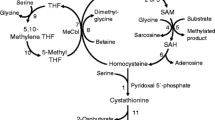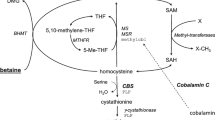Abstract
Strategies for the treatment of cystathionine β-synthase (CBS) deficiency include (1) increasing residual enzyme activity by giving pyridoxine in those patients with vitamin responsive variants, (2) reducing the load on the affected pathway with a low methionine diet and supplementing the diet with cysteine; and (3) giving betaine in order to utilise alternative pathways to remove homocyst(e)ine. In our experience of over 30 years in the diagnosis and management of patients with CBS deficiency, a normal outcome can only be achieved in patients diagnosed and treated from infancy. Pyridoxine combined with folic acid prevents further deterioration in pyridoxine responsive patients. Dietary treatment of patients with non-pyridoxine reponsive CBS deficiency becomes more difficult outside childhood but since late complications are not uncommon must be continued for life. Betaine can be effective in this group but compliance is often poor.
Similar content being viewed by others
Author information
Authors and Affiliations
Rights and permissions
About this article
Cite this article
Walter, J., Wraith, J., White, F. et al. Strategies for the treatment of cystathionine β-synthase deficiency: the experience of the Willink Biochemical Genetics Unit over the past 30 years. Eur J Pediatr 157 (Suppl 2), S71–S76 (1998). https://doi.org/10.1007/PL00014308
Issue Date:
DOI: https://doi.org/10.1007/PL00014308




